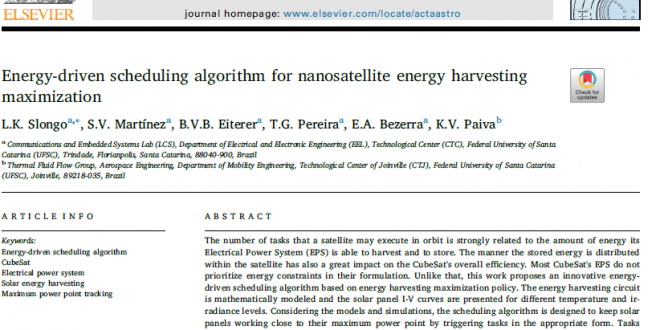الگوریتم زمانبندی بر مبنای انرژی برای به حداکثر رساندن انرژی نانو ماهواره ای
The number of tasks that a satellite may execute in orbit is strongly related to the amount of energy its Electrical Power System (EPS) is able to harvest and to store. The manner the stored energy is distributed within the satellite has also a great impact on the CubeSat’s overall efficiency. Most CubeSat’s EPS do not prioritize energy constraints in their formulation. Unlike that, this work proposes an innovative energy-driven scheduling algorithm based on energy harvesting maximization policy. The energy harvesting circuit is mathematically modeled and the solar panel I-V curves are presented for different temperature and irradiance levels. Considering the models and simulations, the scheduling algorithm is designed to keep solar panels working close to their maximum power point by triggering tasks in the appropriate form. Tasks execution affects battery voltage, which is coupled to the solar panels through a protection circuit. A software based Perturb and Observe strategy allows defining the tasks to be triggered. The scheduling algorithm is tested in FloripaSat, which is an 1U CubeSat. A test apparatus is proposed to emulate solar irradiance variation, considering the satellite movement around the Earth. Tests have been conducted to show that the scheduling algorithm improves the CubeSat energy harvesting capability by 4.48% in a three orbit experiment and up to 8.46% in a single orbit cycle in comparison with the CubeSat operating without the scheduling algorithm.
نویسندگان: L.K.Slongo- S.V.Martínez- B.V.B.Eiterer- T.G.Pereira – E.A.Bezerra – K.V.Paiva
ژورنال: Acta Astronautica
سال انتشار: 2018
دانلود مقاله:





